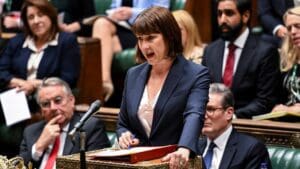
October budget 2024 predictions: what Rachel Reeves could announce
With the Labour government set to present its first budget on 30 October, anticipation is mounting as businesses and individuals alike brace for potential tax changes and spending shifts.
Chancellor Rachel Reeves has made it clear that tax hikes are inevitable, framing them as necessary for restoring fiscal and economic stability. In her address at the government’s investment summit earlier this week, Reeves underscored the importance of this stability as a precursor to investment, signalling that businesses understand the need for such measures to “balance the books.”
While Labour pledged not to raise key taxes affecting working people, such as income tax, VAT, and personal national insurance contributions, the party left the door open to raising employers’ national insurance contributions, capital gains tax (CGT), and other levies, including those on the gambling sector. The rumoured changes have already sparked concern among some industries, with UK-based bookmakers seeing their shares fall following reports of potential tax increases of up to £3 billion in the upcoming budget.
Meanwhile, Prime Minister Sir Keir Starmer has sought to calm nerves, dismissing speculation that CGT could rise to 39% as “wide of the mark,” but confirmed that tax increases would be part of the plan to restore the UK’s economic footing. This comes against a backdrop of criticism from the business community regarding Labour’s handling of the economic legacy left by the previous Conservative government, with claims of a £22 billion fiscal deficit requiring “difficult decisions.”
Here’s a breakdown of the possible changes that Chancellor Reeves could announce in the Autumn Budget 2024:
Employers’ national insurance contributions
One of the most significant potential measures is a rise in employers’ national insurance contributions (NICs). Although Labour ruled out increasing NICs for employees in their election manifesto, they did not extend this promise to employers. Jonathan Reynolds, the business secretary, hinted at this possibility, stating that raising employers’ NICs could be a viable way to boost Treasury revenue without directly impacting workers.
A one percentage point increase in employers’ NICs could raise approximately £8.9 billion a year, offering a substantial boost to government finances as it seeks to plug the fiscal gap. However, this move could face opposition from businesses already struggling with higher costs amid inflation and rising interest rates.
Capital gains tax
Capital gains tax (CGT) is another area under scrutiny. Although Starmer has played down the likelihood of CGT rising as high as 39%, the chancellor may still look to increase CGT rates to bring them more in line with income tax rates, or expand the range of assets subject to CGT. Currently, CGT is levied at 10% for basic-rate taxpayers and 20% for higher-rate taxpayers, with a higher rate applied to property transactions.
Increasing CGT could raise significant revenue, but it also risks disincentivising investment in the UK, particularly in the tech and start-up sectors, which rely heavily on capital investment. Some investors have already accelerated plans to sell their businesses ahead of potential tax increases, highlighting the uncertainty surrounding this issue.
Non-domiciled tax status
The controversial non-domiciled tax status, which exempts foreign-earned income from UK taxation, is also on the table. While Labour has previously criticised the system for allowing wealthy individuals to avoid UK taxes, there are concerns that changing this status could deter high-net-worth individuals and businesses from locating in the UK.
Billionaire John Caudwell, a former Tory donor who switched to supporting Labour, warned against drastic changes to the non-dom tax regime, cautioning that it could harm the UK’s ability to attract wealthy investors. Any changes to this tax status would need to be carefully balanced to avoid negative impacts on inward investment.
Income tax thresholds
Although the chancellor is unlikely to raise income tax rates, she could lower the thresholds at which the various tax bands kick in. Currently, individuals pay 20%, 40%, and 45% income tax depending on their earnings, but reducing the thresholds would bring more people into the higher tax brackets.
This move would allow the Treasury to increase revenue without breaking Labour’s promise not to raise income tax rates. According to the Institute for Fiscal Studies (IFS), reducing the personal allowance or the basic-rate limit by 10% could generate an additional £10 billion and £6 billion, respectively, in annual revenue. However, this approach would still feel like a tax hike to many, as it would effectively increase the tax burden on middle-income earners.
Pensions
Reeves is expected to back away from earlier plans to cut tax relief on pension savings, following warnings that such a move would disproportionately affect public sector workers, including teachers and nurses. Currently, pension contributions are eligible for tax relief at the saver’s marginal rate of income tax, meaning higher earners receive 40% or 45% relief on contributions.
While reducing pension tax relief could potentially raise billions, it would risk alienating a key section of the electorate and sparking backlash from unions and public sector organisations. As a result, it seems likely that the chancellor will avoid making significant changes in this area for now.
Inheritance tax
Inheritance tax (IHT) is another area where Reeves may introduce reforms. While IHT currently applies to only around 4% of estates, it is often viewed as an unfair form of double taxation. Labour could look to increase revenue from IHT by removing exemptions for business and agricultural assets, which are currently passed on tax-free.
A cap on these exemptions, or their abolition altogether, could raise around £2 billion annually, according to the IFS. Other potential changes include closing loopholes that allow wealthy individuals to avoid CGT when passing on estates to their heirs, which could generate additional funds for the Treasury.
Fuel duty
Reeves may break with the Conservative tradition of freezing fuel duty, which has been in place since 2011. Increasing fuel duty could raise an additional £6 billion a year, which would provide a significant revenue boost at a time when the government is looking to close the fiscal deficit. This move could also help steer motorists towards more environmentally friendly vehicles, aligning with Labour’s green agenda.
Private equity profits
The taxation of private equity profits, particularly carried interest, has long been a contentious issue. Currently, carried interest is taxed as capital gains rather than income, meaning private equity executives benefit from lower tax rates. Increasing the tax rate on carried interest to match income tax rates could raise an additional £2 billion in revenue, though it could also lead to behavioural changes that reduce the overall tax take.
Gambling taxes
Reports that the government is considering raising taxes on UK-based gambling companies by as much as £3 billion have already shaken the markets. While Labour may see the sector as a potential source of significant revenue, there are concerns that such a move could harm the industry and lead to job losses.
Other tax options
Reeves has ruled out a wealth tax, despite pressure from trade unions to introduce one. However, the chancellor may introduce a new tax modelled on the health and social care levy introduced by Boris Johnson’s government in 2021. Such a levy could provide a new revenue stream without breaching Labour’s promises on income tax, VAT, or personal national insurance contributions.
Fiscal rules
The chancellor may also tweak the fiscal rules to create more room for public investment. By adopting alternative debt measures, such as public sector net worth (PWNW) or public sector net financial liabilities (PSNFL), Reeves could increase fiscal headroom by as much as £60 billion, providing additional funds for infrastructure and public services.
Read more:
October budget 2024 predictions: what Rachel Reeves could announce

